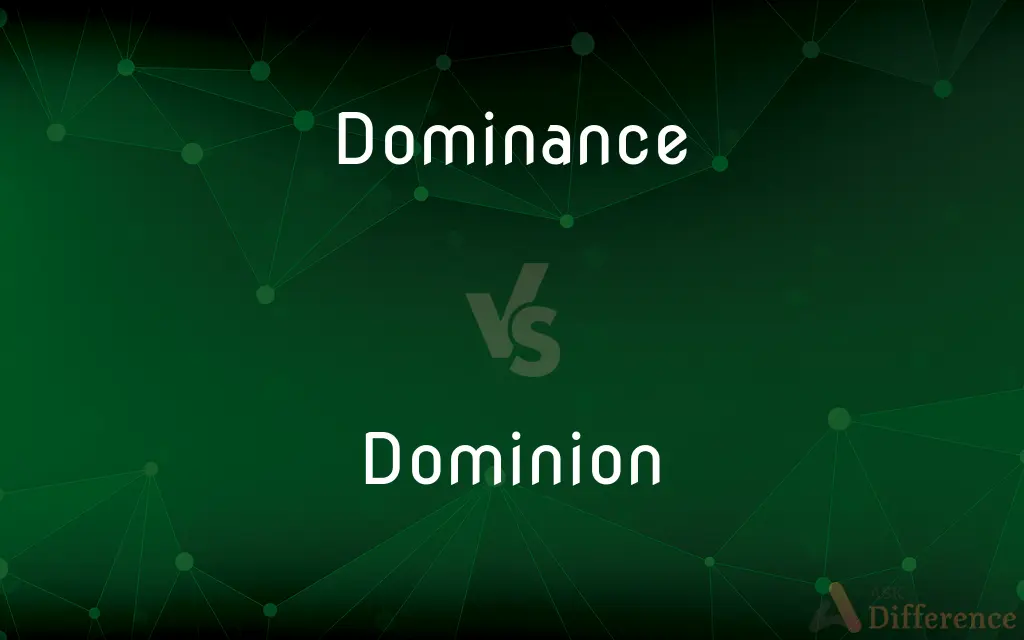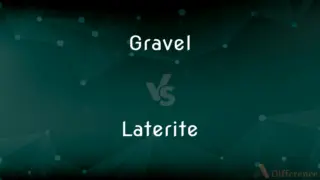Dominance vs. Dominion — What's the Difference?
By Urooj Arif & Fiza Rafique — Updated on April 5, 2024
Dominance refers to power or influence over others, often in social or competitive contexts, while dominion is control or sovereignty over territories or realms.

Difference Between Dominance and Dominion
Table of Contents
ADVERTISEMENT
Key Differences
Dominance involves exerting power, influence, or superiority over others, frequently observed in social, animal, and competitive hierarchies. It signifies an individual's or group's ability to assert control or influence in various situations, emphasizing relational power dynamics. Conversely, dominion refers to governance, sovereignty, or control over domains, territories, or realms. It implies legal or rightful authority to govern or rule, often associated with states, monarchies, or religious authorities.
While dominance is characterized by the power dynamics between individuals or groups within a society or ecosystem, dominion extends to the concept of territorial or jurisdictional control. Dominance can be temporary, fluctuating based on the situation or the individuals involved, whereas dominion usually denotes a more stable and recognized authority over a region or domain.
Dominance is often a result of competition, skill, strength, or social status, playing a crucial role in social hierarchy and interactions. It's about asserting superiority in a way that influences or controls the behavior of others. On the other hand, dominion is established through legal, historical, or divine claims, embodying a broader scope of authority that includes governance, law, and administration over territories.
The pursuit of dominance can lead to conflict, competition, and social stratification within groups, as individuals or factions vie for superior status or control. Dominion, however, is about the administration and governance of territories, involving responsibilities such as law enforcement, resource management, and the welfare of the inhabitants under its control. While dominance is relational and often contested, dominion is recognized and institutional, often codified in law or tradition.
Despite their differences, both concepts share a common thread of control and authority, whether over individuals and social groups or territories and realms. Understanding the distinction between dominance and dominion is crucial for grasping the nuances of power dynamics in social, political, and ecological contexts.
ADVERTISEMENT
Comparison Chart
Definition
Power or influence over others.
Sovereignty or control over territories.
Context
Social, animal hierarchies, competitions.
Governance, legal authority over regions.
Stability
Can be temporary and fluctuating.
Usually stable, recognized by law or tradition.
Basis
Derived from competition, strength, status.
Established through legal, historical, or divine right.
Role
Affects behavior within groups or ecosystems.
Involves governance and administration responsibilities.
Compare with Definitions
Dominance
A state of being in a superior position in a hierarchy.
Her dominance in the field was unmatched.
Dominion
Legal authority to govern or rule a region.
The colonial powers sought dominion over new lands.
Dominance
Exerting control or influence over others.
The alpha wolf's dominance was evident in the pack's hierarchy.
Dominion
Sovereignty or control over a specific territory.
The king's dominion extended across the mountains and valleys.
Dominance
Being predominant in a competitive setting.
The team maintained its dominance throughout the season.
Dominion
The act of ruling or controlling an area.
His dominion over the lands was marked by fairness and justice.
Dominance
The power to influence or direct people's behavior.
The company's dominance in the market was due to its innovative products.
Dominion
The territory of a sovereign or government.
The wildlife reserve fell under the dominion of the federal government.
Dominance
Superiority or ascendancy achieved through competition.
His dominance in negotiations always gave him the upper hand.
Dominion
A realm or territory governed by a ruler.
The queen's dominion was known for its prosperity and peace.
Dominance
The condition or fact of being dominant.
Dominion
The word Dominion was used from 1907 to 1948 to refer to one of several self-governing nations of the British Empire. "Dominion status" was formally accorded to Canada, Australia, New Zealand, Newfoundland, South Africa, and the Irish Free State at the 1926 Imperial Conference to designate "autonomous communities within the British Empire, equal in status, in no way subordinate one to another in any aspect of their domestic or external affairs, though united by a common allegiance to the Crown and freely associated as members of the British Commonwealth of Nations”.
Dominance
The state of being dominant; of prime importance; supremacy.
Dominion
Control or the exercise of control; sovereignty
"The devil ... has their souls in his possession, and under his dominion" (Jonathan Edwards).
Dominance
Being in a position of power, authority or ascendancy over others.
Dominion
A territory or sphere of influence or control; a realm.
Dominance
(physiology) The superior development of or preference for one side of the body or one of a pair of organs; such as being right-handed.
Dominion
Often Dominion A self-governing nation under the nominal rule of the British monarch.
Dominance
The property of a gene such that it suppresses the expression of its allele.
Dominion
Dominions(Christianity) See domination.
Dominance
Predominance; ascendency; authority.
Dominion
Power or the use of power; sovereignty over something; stewardship, supremacy.
Dominance
Superior development of one side of the body
Dominion
Predominance; ascendancy
Dominance
The state that exists when one person or group has power over another;
Her apparent dominance of her husband was really her attempt to make him pay attention to her
Dominion
A kingdom, nation, or other sphere of influence; governed territory.
The dominions of a king
The dominion of the passions
Dominance
The power or right to give orders or make decisions;
He has the authority to issue warrants
Deputies are given authorization to make arrests
Dominion
(taxonomy) kingdom
Dominion
(Christianity) An order of angel in Christian angelology, ranked above virtues and below thrones.
Dominion
Sovereign or supreme authority; the power of governing and controlling; independent right of possession, use, and control; sovereignty; supremacy.
I praised and honored him that liveth forever, whose dominion is an everlasting dominion.
To choose between dominion or slavery.
Dominion
Superior prominence; predominance; ascendency.
Objects placed foremost ought . . . have dominion over things confused and transient.
Dominion
That which is governed; territory over which authority is exercised; the tract, district, or county, considered as subject; as, the dominions of a king. Also used figuratively; as, the dominion of the passions.
Dominion
A supposed high order of angels; dominations. See Domination, 3.
By him were all things created . . . whether they be thrones, or dominions, or principalities, or powers.
Dominion
Dominance or power through legal authority;
France held undisputed dominion over vast areas of Africa
The rule of Caesar
Dominion
A region marked off for administrative or other purposes
Dominion
One of the self-governing nations in the British Commonwealth
Common Curiosities
How does dominance manifest in social contexts?
In social contexts, dominance manifests through hierarchical positions, influence, or authority individuals or groups hold over others.
Can an entity have dominion without being dominant?
Yes, an entity can have legal or sovereign control over an area (dominion) without necessarily being the most influential or powerful force within that territory.
What distinguishes dominance from dominion?
Dominance is about exerting power over others, often in social or competitive contexts, while dominion refers to the sovereignty or control over territories.
Can dominance exist without dominion?
Yes, dominance can exist in interpersonal or social dynamics without any territorial control, reflecting power dynamics rather than governance.
What is the basis for dominion?
Dominion is based on legal, historical, or divine claims to territory, reflecting a recognized authority.
Can dominion change over time?
Yes, dominion can change due to political, legal, or historical developments, altering sovereignty or control over territories.
Is dominion always related to territories?
Primarily, yes. Dominion denotes control or sovereignty over regions, territories, or realms.
What roles do dominance and dominion play in governance?
Dominance plays a role in the power dynamics within governance structures, while dominion relates to the actual authority and jurisdiction over territories.
Can dominance lead to conflict?
Yes, competition for dominance can lead to conflicts within groups or societies as individuals or factions vie for power.
Is dominance always negative?
Not necessarily. Dominance can have positive or negative impacts, depending on how it's exercised and perceived within specific contexts.
How is dominance established?
Dominance is established through competition, strength, social status, or skill, indicating a relational position of power.
How do individuals navigate dominance in personal relationships?
Navigating dominance involves communication, understanding power dynamics, and sometimes negotiation or conflict resolution.
What are modern examples of dominion?
Modern examples include governmental sovereignty over national territories or corporate control over certain market segments.
What historical examples show the impact of dominion?
Colonial empires expanding their dominion over new territories, shaping global history through control and governance.
How do dominance and dominion affect societal structures?
Dominance influences societal hierarchies and interactions, while dominion impacts governance, laws, and administration of territories.
Share Your Discovery

Previous Comparison
Gravel vs. Laterite
Next Comparison
Hiragana vs. KatanaAuthor Spotlight
Written by
Urooj ArifUrooj is a skilled content writer at Ask Difference, known for her exceptional ability to simplify complex topics into engaging and informative content. With a passion for research and a flair for clear, concise writing, she consistently delivers articles that resonate with our diverse audience.
Co-written by
Fiza RafiqueFiza Rafique is a skilled content writer at AskDifference.com, where she meticulously refines and enhances written pieces. Drawing from her vast editorial expertise, Fiza ensures clarity, accuracy, and precision in every article. Passionate about language, she continually seeks to elevate the quality of content for readers worldwide.













































